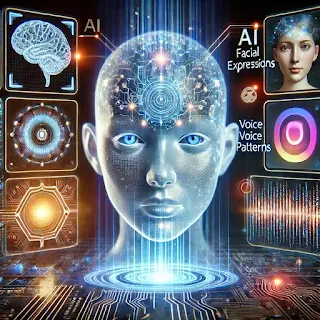Introduction
Artificial Intelligence (AI) is no longer just a tool for automation, data analysis, or problem-solving—it is now deeply intertwined with human emotions. AI-driven emotional intelligence is revolutionizing how we interact with technology, shaping our moods, responses, and even decision-making. With AI acting as an emotional puppeteer, influencing human feelings in ways never seen before, we must explore how this transformation is occurring and what it means for the future of human-AI relationships.
From personalized digital assistants to emotionally responsive chatbots, AI is learning to recognize, interpret, and even manipulate human emotions. This article delves into the fascinating world of AI-driven emotional intelligence, its impact on various industries, ethical concerns, and the future of emotionally aware machines.
The Rise of AI Emotional Intelligence
Traditional AI systems were built to process logic, data, and numbers, but with advancements in machine learning and deep learning, AI is now capable of understanding and responding to human emotions. Emotional AI, also known as Affective Computing, focuses on developing systems that can:
Recognize human emotions through facial expressions, voice tone, and language patterns.
Adapt responses based on detected emotional states.
Influence user emotions through tone, visuals, and language structures.
Companies like Google, Apple, and Microsoft are integrating emotional AI into virtual assistants and chatbots, creating hyper-personalized interactions that feel more human-like and emotionally aware.
How AI Influences Human Emotions
AI acts as an emotional puppeteer in several ways, subtly shaping how users feel and respond to different situations. Some of the key methods include:
1. AI in Social Media and Digital Content
Social media platforms use AI-driven algorithms to curate content that resonates with users’ emotions. By analyzing engagement patterns, AI can:
Prioritize content that triggers strong emotional reactions, such as joy, outrage, or nostalgia.
Tailor advertisements to elicit specific emotional responses, increasing conversions.
Detect user sentiment and adjust feeds accordingly, enhancing user engagement and retention.
2. AI in Customer Service and Chatbots
Emotional AI is transforming customer service by creating chatbots and virtual assistants that respond with empathy. These AI-driven entities:
Recognize frustration in customer interactions and adjust tone accordingly.
Use sentiment analysis to provide a more personalized experience.
Reduce negative experiences by offering solutions in a calming and reassuring manner.
3. AI in Healthcare and Mental Well-Being
AI-powered emotional intelligence is making significant contributions to healthcare and mental health by:
Assisting in diagnosing mental health conditions through speech and facial recognition.
Providing therapeutic chatbot interactions to those suffering from anxiety or depression.
Monitoring emotional well-being in patients and alerting healthcare professionals when necessary.
4. AI in Gaming and Entertainment
The gaming industry is leveraging emotional AI to create immersive and emotionally dynamic experiences. AI-driven characters and narratives:
Adapt storylines based on player emotions.
Create personalized soundtracks and visual effects that enhance mood.
Respond dynamically to player actions, creating deeper engagement and emotional connections.
5. AI in Marketing and Advertising
Emotional AI is reshaping the way brands connect with consumers. Marketers use AI to:
Craft emotionally compelling advertisements based on audience sentiment analysis.
Optimize ad delivery times to coincide with users’ emotional states.
Leverage facial recognition technology to gauge reactions to promotional materials.
The Ethical Concerns of Emotional AI While AI’s ability to influence human emotions offers many benefits, it also raises ethical concerns. Some of the key issues include:
1. Manipulation and Exploitation
AI-driven emotional analysis can be used to manipulate emotions for commercial or political gain. For instance:
Social media platforms can amplify divisive content to boost engagement.
Companies can exploit consumer emotions to increase spending.
2. Privacy and Data Security
Gathering and analyzing emotional data brings notable privacy concerns, leading to questions about:
How emotional data is stored and used.
Whether users are aware of the extent to which their emotions are being tracked.
3. Dependence on AI for Emotional Support
As AI becomes more emotionally intelligent, users may develop emotional dependencies on virtual assistants, chatbots, or AI-driven therapy. This reliance may:
Reduce human-to-human interactions.
Lead to psychological effects if AI interactions replace real emotional connections.
The Future of AI-Driven Emotional Intelligence
As AI continues to evolve, emotional intelligence in machines will likely become even more advanced. Future developments may include:
Hyper-Personalized AI Companions: Virtual AI companions capable of forming deep emotional bonds with users.
AI-Powered Mental Health Therapists: More sophisticated AI-driven therapy models with greater accuracy in emotional analysis.
Emotionally Adaptive Learning Systems: AI-driven educational platforms that tailor lessons based on students’ emotional states and engagement levels.
To ensure a responsible and beneficial integration of emotional AI, developers and policymakers must work together to establish ethical guidelines, ensuring AI remains a tool for enhancing well-being rather than exploiting emotions.
Conclusion AI has transcended its role as a mere computational tool and has become an emotional puppeteer, shaping human emotions in profound ways. From social media algorithms to therapeutic chatbots, AI’s influence on emotions is vast and growing. While this transformation offers numerous benefits, ethical considerations must be prioritized to prevent manipulation and ensure user well-being.
As emotional AI continues to evolve, striking a balance between innovation and responsibility will be key to harnessing its potential for the betterment of society. Whether AI becomes a force for good or a tool for exploitation depends on how we choose to integrate and regulate its emotional capabilities in the years to come.

No comments:
Post a Comment